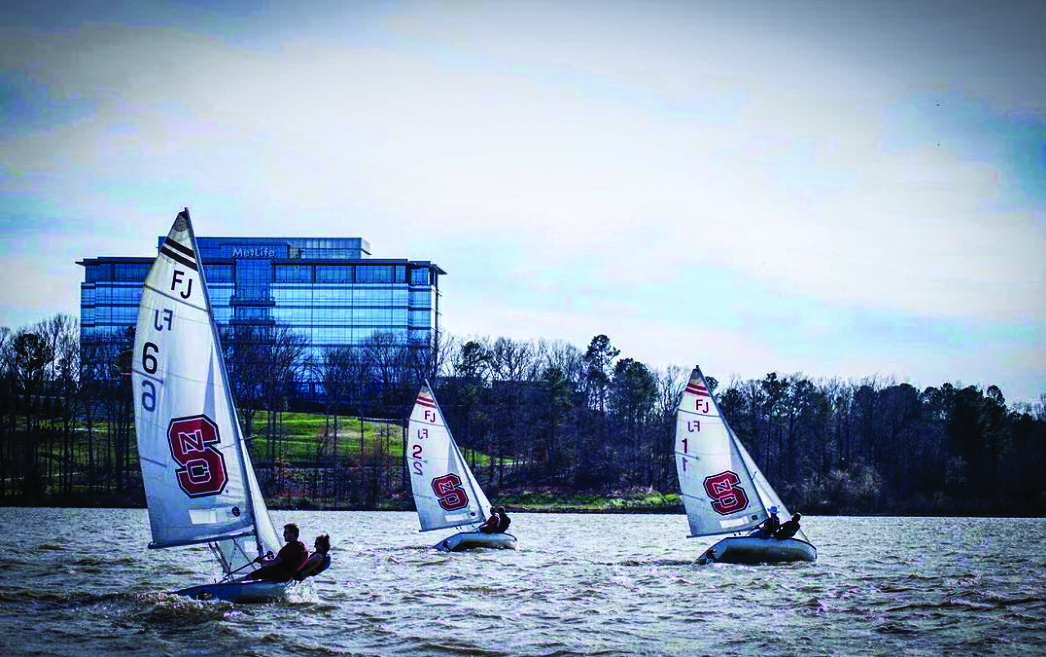
Contributed by Wikimedia Commons
Lake Crabtree County Park closed many of its hiking and biking trails June 1 as part of a redevelopment plan that has left local cyclists, hikers and NC State students reflecting on the loss of one of the area’s most accessible outdoor spaces.
After the Wake County Parks, Recreation and Open Space’s lease on Lake Crabtree County Park with the Raleigh-Durham Airport Authority ended this year, new rules by the Federal Aviation Administration on land lease and sale valuation have come into effect, requiring any airport land to be sold or leased at fair market value.
Beginning in 1985, when the land was first leased to Wake County by the airport, the agreed-upon yearly rate was, and has been, $1 per year until now. While a new lease for the boating and playground areas at the park has been signed with Wake County at an annual rate of $214,488 with 3% yearly escalation over 20 years, the new lease does not include the 148 acres of hiking and mountain biking courses previously within the park.
The RDU board announced on July 17 that it would be selecting Pacific-Elm Properties to redevelop the 136 acres of forest, formerly part of and now behind Lake Crabtree County Park. The group says its goal is to build a “recreation and wellness destination” that could possibly include commercial spaces as well as recreational facilities. This change has many Wake County residents concerned that a once publicly available outdoor space could be lost.
Justin Stephens, a fourth-year student studying industrial engineering and a cycling club member, helps run a local mountain biking team, which used the park multiple times a week for practices before its closure.
“I’ve been going to Crabtree since probably the beginning of high school. I raced on this team in middle and high school, and our main practice location was Crabtree,” Stephens said. “I helped coach with them now, and that was still our main practice location.”
The park was one of the most accessible areas for Stephens’ team, the Southern Lake Trailhawks, who compete in the National Interscholastic Cycling Association, due to its location in the heart of the Research Triangle.
“Crabtree is kind of unique. It’s extremely close to Raleigh and Cary, it’s a 15-minute drive from NC State and a 10-mile bike ride from NC State,” Stephens said. “Connected to greenways on both sides, because you can ride the greenway from NC State to get there.”
Charles Thompson, service manager at Oak City Cycling, also talked about the impact Lake Crabtree’s trails had on the Raleigh area.
“It’s also the trail that was there for so long that a lot of people just felt at home. So it was a very comfortable trail for a lot of people,” Thompson said. “Most people I know, that was their first mountain bike trail.”
The importance of Lake Crabtree’s trails was noted, not just for the park’s main trails but its diversity of courses for different experience levels and goals for riding.
“Crabtree is the legal trail there, but there were four other trails from that same parking, so, like, they took away the most legitimate hub of what was actually just a huge area where you could do a lot, right?” Thompson said.
While residents are mourning the loss of an important hiking and biking hub, Wake County parks officials are trying to move forward to maintain and improve parks while adapting to the changes at Crabtree.
Chris Snow, the Director of Parks, Recreation and Open Space for Wake County, gave internal insight on what might happen at the park and others still managed by Wake County, as well as informed residents about what they can do to be included in the process at Lake Crabtree.
While much of the planning so far has been discussed in meetings with developers and the RDU-Airport Authority, planners want residents to know they plan to involve the public in their plans going forward.
“They are having a series of public engagement meetings,” Snow said. “The first of which is August the 19th, these are public feedback meetings, where I’m sure they’re going to unveil some ideas and get people’s reactions.”
People are strongly encouraged to attend these meetings if possible, as the Airport Authority wants residents’ input on the ideas they produce for the park.
“But also, we’ll be looking for the public’s input on this stuff, too. So we have heard the Airport Authority has said from early on in this process that they wanted the development to be very compatible with the public park,” Snow said.
While the park’s closure takes away some of the riding and hiking trails in the Area, the 286 mountain bike trails are still open on the other side of I-40 from Lake Crabtree.
“I hate to lose a recreational amenity,” Snow said. “But at the same time, what most people understand is that property belongs to the airport, and they made a choice to move towards developing it … while folks hate that trails are going away, there are opportunities in the future for potentially something really cool.”